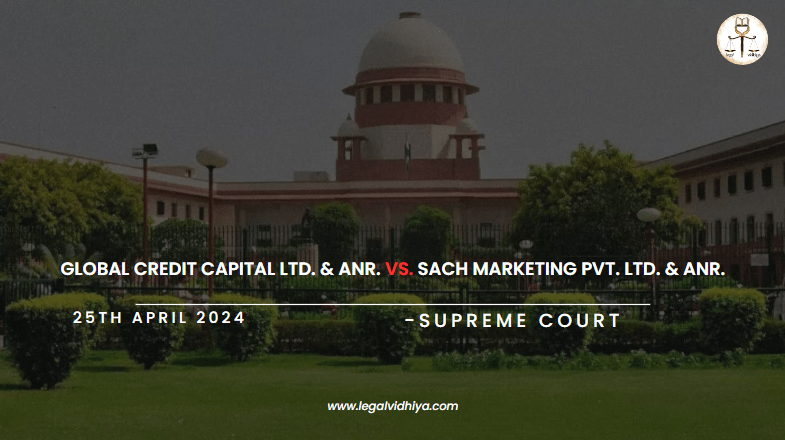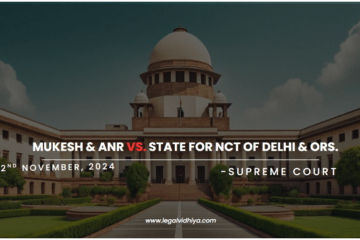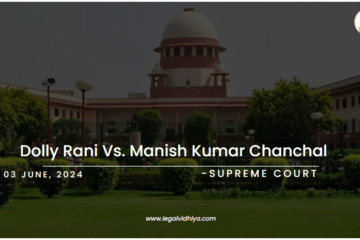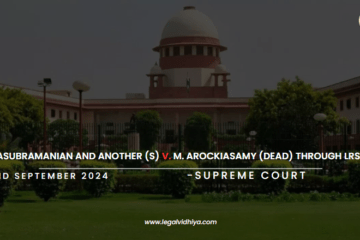
| CITATION | 2024 INSC 340 |
| DATE OF JUDGMENT | 25th April 2024 |
| COURT | Supreme Court of India |
| APPELLANT | Global Credit Capital Limited & Anr. |
| RESPONDENT | Sach Marketing Pvt. Ltd. & Anr. |
| BENCH | Abhay S. Oka, Pankaj Mithal |
INTRODUCTION
The case of Global Credit Capital Limited & Anr. vs. Sach Marketing Pvt. Ltd. & Anr. Revolves around the classification of debts under the Insolvency and Bankruptcy Code, 2016 (IBC). The dispute arises from conflicting interpretations of agreements between a corporate debtor and various creditors. The primary issue is to determine whether the creditors involved should be recognized as financial creditors and to analyze the nature of the debts owed by the corporate debtor. This classification is crucial because it influences how the debts owed by the corporate debtor are treated and resolved. The case is significant because its outcome could impact how similar insolvency cases are handled in the future, thereby affecting the overall application of insolvency laws in India
FACTS OF THE CASE
- The legal dispute arose from contractual agreements between M/s. Mount Shivalik Industries Limited, a corporate debtor, and various creditors, notably including Sach Marketing Pvt. Ltd., who is the first respondent.
- Two separate appeals were brought before the Supreme Court of India challenging judgments and orders issued by the National Company Law Appellate Tribunal (NCLAT).
- The primary issue in the first appeal was to determine whether the first respondent qualified as a financial creditor under sub-section (7) of Section 5 of the Insolvency and Bankruptcy Code, 2016 (IBC). The NCLAT’s judgment dated October 7, 2021, concluded that the first respondent indeed qualified as a financial creditor.
- The second appeal addressed the issue of whether four other respondents were also financial creditors of the same corporate debtor. The NCLAT’s decision in this regard followed the judgment made in the first appeal.
- Two agreements dated April 1, 2014, and April 1, 2015, between the corporate debtor and the first respondent in the form of letters from the corporate debtor, appointed the first respondent as a ‘Sales Promoter’ to promote beer manufactured by the corporate debtor in Ranchi, Jharkhand.
- As per the terms of these agreements, the first respondent was required to deposit a minimum security amount with the corporate debtor, which would carry interest at 21% per annum. The corporate debtor was to pay interest on a portion of this deposit amount at the same rate.
- The first respondent initially filed a claim as an operational creditor but later refiled it as a financial creditor. After some back and forth, including the rejection of the claim by the second respondent, who was appointed as the Interim Resolution Professional, the matter proceeded to the National Company Law Tribunal (NCLT) and eventually to the National Company Law Appellate Tribunal (NCLAT), which ruled in favor of the first respondent.
- Meanwhile, four other respondents had also provided financial assistance to the corporate debtor. Their claims were rejected by the Resolution Professional. Subsequently, they filed applications before the NCLT, which were later rejected. However, the NCLAT allowed their appeals based on its judgment in the first appeal.
ISSUES RAISED
- Whether the debt owed to the first respondent should be classified as a “financial debt” or an “operational debt” under the Insolvency and Bankruptcy Code, 2016.
- Whether the respondents qualifies as a “financial creditor” under the Insolvency and Bankruptcy Code, 2016, based on the agreements with the corporate debtor?
CONTENTIONS OF APPEALENT
- The appellant’s counsel argues that the first respondent should be classified as an operational creditor, not a financial creditor, based on the agreements dated April 1st, 2014, and April 1st, 2015.
- According to the agreements, the first respondent was appointed as a Sales Promoter to promote beer manufactured by the corporate debtor, indicating a service-oriented relationship rather than a financial one.
- They contend that the security deposit required by the agreements is not a financial debt but rather a condition for the first respondent’s appointment as a Sales Promoter.
- They argue that the interest payment on the security deposit does not automatically qualify the debt as a financial one, citing various legal precedents.
- The appellant claims that the NCLAT misinterpreted the true nature of the transaction, leading to an incorrect redefinition of financial and operational debts under the Insolvency and Bankruptcy Code (IBC), which affected the judgment.
CONTENTIONS OF REPONDENT
- The senior counsel for the first respondent, after a thorough examination of the agreements, argues that the transaction was financial. The corporate debtor’s acknowledgment of interest payments and the deduction of TDS support this classification.
- The respondents assert that the transaction satisfies all criteria for a financial debt, including money disbursal, expectation of repayment with interest, and the commercial effect of borrowing.
- The NCLAT’s decision was based on an accurate interpretation of the agreements’ terms. They believe the NCLAT correctly assessed the transaction’s real nature and effect, supported by a thorough understanding of the agreements and relevant case law.
- The respondents argue that the agreements were tools used by the corporate debtor to raise finance, not for genuine sales promotion services. They claim that such arrangements were designed to meet the corporate debtor’s financial needs.
- The respondents highlight that the corporate debtor has a history of using similar agreements to raise funds. This pattern indicates financial arrangements disguised as service agreements.
JUDGEMENT
After meticulous review, the Supreme Court upheld the judgments made by the National Company Law Appellate Tribunal (NCLAT). It affirmed that the creditors in question qualified as financial creditors under the Insolvency and Bankruptcy Code, 2016 (IBC). The Court also confirmed that the debts owed by the corporate debtor to these creditors constituted financial debts within the purview of the IBC. In reaching this decision, the Court thoroughly examined the contractual agreements between the corporate debtor and the creditors. Confirming that the security deposits made under the agreements constituted financial debt, the Court emphasized that the amounts raised represented debts with interest, fulfilling the conditions of financial debt as defined in Section 5(8) of the IBC. Furthermore, the transactions had the commercial effect of borrowing, as evidenced by the corporate debtor’s financial statements and the nature of the agreements.
ANALYSIS
The court carefully examined the terms of the agreements between the corporate debtor and the first respondent, focusing on clauses related to payment structures, appointment durations, termination protocols, and a significant security deposit. The court raised doubts about the true nature of the transaction because the Rs. 4,000 monthly payment to the first respondent seemed unrelated to sales or other contractual duties. Moreover, the absence of a forfeiture clause for the security deposit indicated that the corporate debtor was obligated to refund it with accrued interest upon contract termination. When examining what qualifies as an “operational debt” under the Insolvency and Bankruptcy Code (IBC), the court emphasized that for a claim to be considered operational, it must be correlated to the provision of goods or services. Among the terms of the agreement, only the monthly payment seemed to fit this category. Despite the agreement’s provision for a 21% interest per annum, the court observed a lack of correlation between this rate and the services provided, raising doubts about the accuracy of the debt representation. The court then examined what qualifies as “financial debt” under the IBC, particularly looking at clause (f) of sub-section (8) of Section 5, which covers transactions with the commercial effect of borrowing. The court’s conclusion was supported by how both parties treated the money raised under the agreements in their financial records, showing characteristics of borrowing.
CONCLUSION
In this case the Supreme Court delivered an important decision regarding how debts are classified under the Insolvency and Bankruptcy Code, 2016 (IBC). Through careful examination of contractual agreements and legal precedents, the Court affirmed that the creditors in question qualified as financial creditors and their debts constituted financial debts within the ambit of the IBC. The Court looked closely at the agreements and the company’s financial records of the corporate debtor to gain clarity on the true nature of the transactions. Thus, ensuring consistency in the application of insolvency laws in India and setting a precedent for future cases.
REFERENCES
This Article is written by Ananya Saren student of Surendranath Law College, University of Calcutta; Intern at Legal Vidhiya.
Disclaimer: The materials provided herein are intended solely for informational purposes. Accessing or using the site or the materials does not establish an attorney-client relationship. The information presented on this site is not to be construed as legal or professional advice, and it should not be relied upon for such purposes or used as a substitute for advice from a licensed attorney in your state. Additionally, the viewpoint presented by the author is of a personal nature.




0 Comments